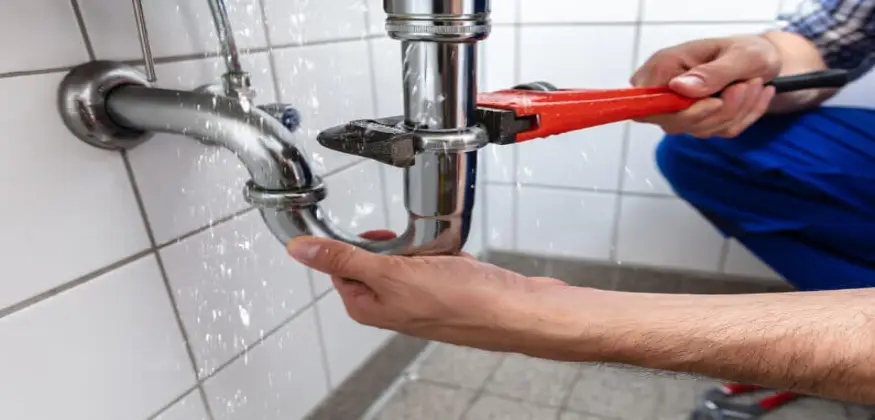
Did you know that you can waste 250 gallons of water per day through a tiny 1/8-inch crack in a pipe? That's far from a small problem!
And a larger leak from a busted pipe can be even worse.
If you suspect a leak in your home, this is why it is extremely important to find it and have it repaired. Not only are you pouring money out on the ground, but you're also wasting water, a precious resource.
To stop this from happening, learn the signs of plumbing problems and how to find a busted pipe here.
1. Skyrocketing Water Bill
Has your water bill suddenly gone up for no apparent reason? If your area has recently experienced a hike in water prices or you've been hosting guests for a few weeks, it's expected to see your water bill go up. But what if your bill goes up when there doesn't seem to be an explanation for it?
It's likely that there is a leak and hundreds of gallons of water are seeping out into your yard — or worse, into your house somewhere. If you do find a leak, be sure to talk with your utility company. Some companies are willing to adjust the price on an out-of-control water bill due to a large leak.
2. A Drop in Water Pressure
Coming home after a long, stressful day and taking a warm shower with lots of water pressure, can be a delightful way to soothe sore muscles and relax. But have you noticed when you turn on the shower, the pressure seems to have dropped? It won't always drop down to a pathetic dribble, so take notice even if there still is pressure, but it seems to be less.
You may also find that the sink or toilet clogs easier because there is less water pressure to push debris down and fully clear the pipe.
This happens because a leak is allowing some of the water to escape, reducing the pressure that makes it to your appliances.
3. Water Damage
To get to bathrooms, laundry rooms, and kitchens, water pipes may run through the walls or ceiling. This is particularly common in two-story homes as one-story houses will often have the bulk of their plumbing system in the crawlspace beneath the house.
Regardless, you may have pipes running through your walls or ceiling and if they break, they can cause some serious water damage.
Keep an eye out for wet spots in the ceiling or walls. You might notice condensation, dampness, or yellowish or brownish water stains appearing.
If the leak has caused enough damage, it may be necessary to remove and replace part of the wall or ceiling to repair it. At an absolute minimum, the entire area must be fully dried. Any building materials that are still damp can offer a hospitable environment to nasty problems like mold and mildew. If allowed to grow unchecked, this can negatively affect the air quality in your home.
4. Whistling Pipes
Do your pipes whistle while they work? Dented pipes can restrict the flow of water. This causes a whistling sound as water is forced through the narrow shaft. Additionally, if you hear running water or dripping sounds when all the faucets are off in your house, this indicates a leak somewhere.
Low or fluctuating water pressure can cause your pipe system to move around, creating banging and grinding noises. If they are banging hard enough, they can actually cause further damage, so if you hear this, call a professional immediately. You also might notice hissing or gurgling sounds, which also indicate that the pressure can be fluctuating.
Finally, if water makes it into your sewer system it can create a bubbling sound.
Basically, if you turn off all the taps in your house and still hear noises related to your pipes, you could very well have a leak.
5. Dirty Water
Old metal pipes can begin to rust, giving the water coming out of your faucet a brownish cast. Even PVC or PEX pipes can give water a brownish color as they begin to deteriorate. Additionally, the water can have a faint unpleasant odor.
This is an indication that you already have a leak, or the pipe is about to burst. Rust will eat away at the pipe until it becomes thin enough that the water pressure causes it to crack or burst, or the rust simply eats a hole in the pipe.
6. Stinky Smells
Does your house smell like rotten eggs? This could be an indication of a leaky sewer pipe. Hydrogen sulfide is naturally produced in the sewer pipes by all that yuck running through the system. This is what creates that rotten egg smell.
A leak will allow this gas to escape, perfuming your home with an unwelcome essence.
Don’t try to handle this type of leaky pipe situation on your own. Though it’s always a good idea to call a professional for any plumbing problem, it is even more important when dealing with raw sewage. It simply isn’t worth the health risk.
7. Soft Spots in Your Yard
If you have a broken pipe outside your home, you might notice soggy spots or water pooling in your yard. Particularly green areas of your lawn can indicate a sewer leak. Additionally, driveways, walkways, or other hardscape accents may start to crack as the ground becomes soft underneath them and begins to sink.
Repairing Your Busted Pipes in Austin
So, now you know that you might have a busted pipe in your house somewhere. How do you fix it? The easy way! Call us here at Mr. Rooter in Austin, Texas. We'll find your leak and get to work repairing it as fast as possible so you can get back to the more important things in life.
Contact us today to learn more!

